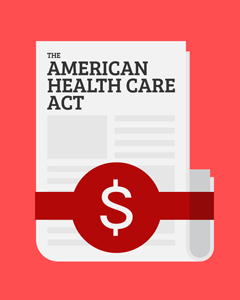Group health insurance expert weighs in
 The American Health Care Act is President Trump’s answer to President Obama’s hotly-debated Affordable Care Act. While many political experts are excited about the new plan, others wonder if the proposed penalty is similar in nature to the dreaded Obamacare penalties, which many complained laid an undue financial hardship on those least able to foot the bill.
The American Health Care Act is President Trump’s answer to President Obama’s hotly-debated Affordable Care Act. While many political experts are excited about the new plan, others wonder if the proposed penalty is similar in nature to the dreaded Obamacare penalties, which many complained laid an undue financial hardship on those least able to foot the bill.
Rob Wilson, group health insurance expert and President of Employco USA, says, “President Trump’s plan is exciting for employers for many reasons, including the removal of the taxes, the mandate penalties and the subsidies that were a cornerstone of Obamacare. As for the new proposed penalty, it only applies to anyone who opts to go without insurance for longer than 63 days and then desires to resume coverage.”
The purpose of this penalty, Wilson explains, is to keep people from dropping in out and of the market. However, it also allows for healthy individuals to opt not to buy a healthcare plan if they so desire.
“Part of the problem with Obamacare was that it forced people to buy coverage even when they did not need it or use it,” says Wilson. “Under President Trump’s plan, people can opt to buy insurance only when they actually need it. Even if a person were to take a penalty for not buying insurance and retaining it, it would still amount to less under The American Health Care Act than Affordable Care Act, so Americans still save big.”
For more on this topic, please contact Rob Wilson at rwilson@thewilsoncompanies.com.
 Recent statistics reveal that March Madness has become more popular than ever before, thanks in large part to the worldwide betting that takes place. Over 60 million people are expected to fill out brackets this year, with an estimated $10 million being put on the table. However, there is another cost which people may not expect: a downturn in employee productivity.
Recent statistics reveal that March Madness has become more popular than ever before, thanks in large part to the worldwide betting that takes place. Over 60 million people are expected to fill out brackets this year, with an estimated $10 million being put on the table. However, there is another cost which people may not expect: a downturn in employee productivity. A human resource and employment solutions firm, Employco USA promoted an employee to vice president of payroll services.
A human resource and employment solutions firm, Employco USA promoted an employee to vice president of payroll services. According to the National Federation of Independent Business, the Index of Small Business Optimism increased by 11 points this past quarter,
According to the National Federation of Independent Business, the Index of Small Business Optimism increased by 11 points this past quarter,  Not many people expect that President Trump will raise the minimum wage. In fact, during the primaries, he famously declared that American wages were already “
Not many people expect that President Trump will raise the minimum wage. In fact, during the primaries, he famously declared that American wages were already “ Job numbers from Friday reflect the final full month of President Obama’s presidency, and experts say they are disappointing and not what they should have been. Now, as Americans look to the future, they wonder what Trump’s presidency means for jobs.
Job numbers from Friday reflect the final full month of President Obama’s presidency, and experts say they are disappointing and not what they should have been. Now, as Americans look to the future, they wonder what Trump’s presidency means for jobs.


